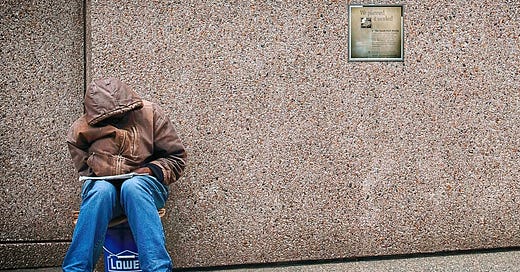Personal touch is key to helping the homeless rebuild their lives
Family reunification programs can provide the unconditional love, support and purpose that is essential to recovering from trauma
EDITOR’S NOTE: This piece is a part of our #GovernorGoals series. Learn more about it here. Send your goals on one of the selected topics to theway@or360.org for potential publication.
The Oregon Way #GovernorGoals essays have been positive, thoughtful, and productive. (Read pieces here, here, and here). Those on homelessness mostly have focused on resources, regulation, access to health care, public safety, and equity. While I applaud the effort and agree with many of the recommendations, I would offer an additional observation based on 35 years of working in criminal justice:
We need to help people suffering housing insecurity build a sense of self-worth through unquestioned compassion and by reviving long-term personal connections that are based on unconditional love.
As a deputy district attorney, municipal court judge, defense trial attorney, and public defense administrator, I’ve represented thousands of people – many of whom were homeless or facing housing insecurity. I helped establish the Washington County Veterans Treatment Court. It’s a specialty court that focuses on justice issues involving veterans, most of whom suffer with PTSD or traumatic brain injury. Some also struggle with housing insecurity and homelessness.
Here’s what I’ve seen. Many justice-involved homeless people I’ve represented over the years have few positive personal relationships. Rebuilding, or finding, positive relationships and severing negative relationships is a key to recovering a sense of self- worth and that leads to success. Those positive relationships must be long-term, personal and unconditional.
Building these relationships usually means reconnecting with family. More than once, I’ve seen Veterans Court participants who were estranged from their families enter treatment and succeed because they were able to reconnect with family who love them and whom they love. As the strength of their renewed relationships grew, their sense of self-worth grew. They then became stronger in their conviction that they deserved a chance to succeed. They wanted to re-establish their family.
Unfortunately, not everyone has family relationships that can be salvaged. I believe there's a role for government-faith partnerships to bridge this gap in serving the homeless. Connecting with a religion-based support group that offers positive and unconditional love is a way to build consistent and long-term relationships for those who lack family ties. The Salvation Army already provides excellent shelter services in our community. (I’m an atheist, but I recognize that you can appreciate and benefit from love-based sociology of religions without embracing the mystical and regulatory aspects.)
Public agencies, nonprofit substance abuse treatment providers and therapists are vitally important. The ideas and proposals related to homelessness provided by Oregon Way contributors are spot on in many cases. My clients can’t begin to renew their family relationships without those services to support their needs. But therapists, social workers, and treatment providers are not able to provide the necessary unconditional long-term positive relationships and love that humans need. Only families or other long-term unconditional support systems can provide that necessity for a content life.
I recognize that my contact with homeless and the housing insecure is limited to those who are involved in the justice system and that many succeed without rebuilding their long-term personal relationships. But where the relationships can be renewed, especially with family, the chances for successfully achieving a more content and secure future increases tremendously.
If family members are located and willing, they could be involved in the needy person’s addiction and mental health counseling so they can understand the challenges and issues that will arise in reintegrating an estranged family member back into their lives. Family reunification counseling, which can address the conflicts and challenges in the family both current and historical, could be offered. And, if a family member has room, they could be given a stipend for providing a home.
I’ve seen many people in the justice system fail to succeed because they simply don’t have a personal support system. I’m hopeful that in some cases offering services and support to families of the homeless and the housing insecure could renew the long-term support system of unconditional love that humans need to thrive and which no therapist, agency or program is able to fill.
Rob is managing partner of Harris Velazquez Gibbens, Attorneys, a litigation law firm
Photo credit: "We Planned It Worked" by Ian Sane is licensed under CC BY-NC-ND 2.0





An excellent post. Thank you for your hard work in our community. You should write this as an oped in the Oregonian!